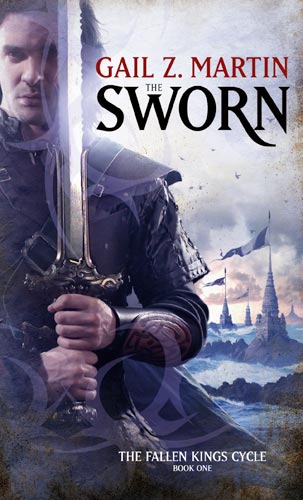 by Charles Gannon
by Charles Gannon
A thought-piece on the nature of American Narratives
Arguably, there are some useful analogies between cooking a gourmet dish and cooking up a saleable story. One of the analogies resides in the multiple avenues of sampling and analysis that are possible. To choose a pertinent example, one can choose to assess the dish itself, or the ingredients that are used to create it. The latter is my focus in this micro-essay—and the narrative cuisine in question is science fiction.
While not particular to any region, science fiction seems to be served up in the US far more frequently–and with greater gusto—than any other country. It is also not known for being a ”light” cuisine: science fiction narratives tend to be sizable repasts. This does not imply that they are always intellectually nourishing (as evinced by the ideational junk-food that still dominates the output of Hollywood) but usually do manage to sate audiences’ appetites for action and adventure; they are filling, at the very least. Or, in overtly literary terms, they are rarely humble opuscules; they are usually ambitious epics.
So,by this (threadbare) process of analogical deduction, an examination of the nature—and impulses—of the American Epic should, potentially, explicate certain of the creative threads that are both employed by, and give shape to, American science fiction. However, since there are plenty of American epics that are not science fictional, perhaps it makes sense to approach this topic through a sub-genre that is seasoned by both the mainstream and genre traditions. Consequently, American “bigger-than-life” disaster narratives may prove to be a useful point of entry into the subject–of which, because of this short fomat, we may only expect a fleeting glance, not detailed scrutiny.
* * *
Arguably, many, if not most, American epics are morality plays cum primers which either reprise, revise, or rejuvenate what might be called the nation ‘s “moral self-image in the course of a crisis.” The Towering Inferno, The Poseidon Adventure, 2012, Earthquake, and Deep Impact all have this in common: a group of individuals who are spun from the very warp and woof of the nation’s life must work together to rise above the challenge that they face. In the course of so doing, differences of class, ethnicity/race, gender, region, education, experience, are shown to be not merely baseless, but impediments that must be shed in the face of a crisis. Those who cannot, or (more severely) will not give in to this situational compulsion for what might be called “cultural transcendance” almost inevitably meet grisly ends, usually hoist by their own petards and expiring unlamented. Other, right-thinking persons may die along the way, but they are memorialized, held up as examples (often to a recidivistic group member who is shamed into moral rectitude by the sacrifice of the deceased). Perhaps the most trite and hackneyed version of this latter trope is that of the righteous person of color who voluntarily sacrifices him/her-self to ensure the survival of the rest of the group—including the prerequisite bigot—when a desperate but ingenious bid to escape the onrushing forces of destruction goes horribly and unpredictably awry in the film’s penultimate scene.
What are the core “cultural values” being celebrated by these narrative tropes and structures—and so many others which there is no space to list here? And why are they (as a syncretic whole) so peculirly American?
There are many possible reasons (and I warmly encourage others to take up the ennumeration and analysis of all of them) but I can only deal with one here, so I will focus on what I consider both the strongest, and also, the most provocative, factor in the mix: these tropes establish the essential national virtue of American culture–a value with deep, even urgent roots in the nation’s social contracts. Specifically, these narratives indicate that a ‘good’—and certainly a ‘heroic’—American need not be shrewd, or strong, or deft. But two traits are required—prerequisites for which no substitutes are allowed or tolerated: the hero of an American Epic must have the qualities of basic integrity (“say what you mean; do what you say)” and determination (never give up and always do your best).
What is most interesting and illuminating about these traits is their utterly democratic nature, insofar as any person may aspire to excel at them, regardless of other innate talents, predispositions, or impediments. These are the qualities celebrated not just in the form of bold heroes upon battlefields or stranded in the wilderness, but also in the Special Olympics, where physical and mental disabilities present a steep and unforgiving challenge to the participants. But that challenge becomes a peculiarly poignant and powerful opportunity to express the epic-heroic values of integrity and determination, largely because it is a foregone conclusion that no one in the special Olympics is going to set a true world’s record. Nor are they going to earn mention in the Guinness Book of World Sports Records. And because of that, the entire emphasis, and test, of the Special Olympics is focused upon those two qualities to which anyone may aspire, and therefore, which are celebrated as the only prerequisite American (because universal) traits: integrity and determination. The political and social pragmatism (and constancy) of this valuation is a noteworthy feature of most American epics: each one serves as a kind of “folk-tale” retelling, reinforcement, and revalidation of the nation’s most fundamental juridical, political, and philosophical credos. In essence, America reasserts, restores, and remakes itself it in every epic that it produces. And its science fiction epics are no exceptions to this rule: indeed, they may be its exemplars. But that, alas, would be the subject of another micro-essay…
Other cultures may dismiss the basic values celebrated in America’s epics as childishly delusional: that lauding mere determination and integrity simply means that the morality of an idealized playground has been hypertrophied into a cultural ideology. This may be true, to some degree, and to the degree that it is, it may say and reveal something about America’s adolescent zeal and immaturity, about its idealism, and perhaps its uncritical self-confidence. But it may also reveal something about people who perceive only ingenuousness in such values, may reveal not merely their worldiness, but also a predisposition toward niggardly pessismism, toward a prudent but self-limiting cynicism. As one philosopher observed, every object has the defects of its virtues. Apparently, different cultures and their epics are not exceptions to this rule.
In closing, look for America in all its epics. But especially, look for the nation in its seemingly non-political science fictional epics, because—since the tales are usually freed of the specific flags and partisan outcries of the moment—they often hold a clearer lens up to America’s core heroic values than any other narratives do—or can.
You can listen to the audio from when Charles was a guest of Blog Host, Gail Z. Martin’s Ghost in the Machine podcast here: https://www.audioacrobat.com/play/WVkgV7SX













